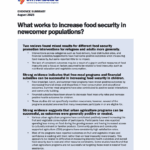Anti-Asian and anti-immigrant sentiment has surged in the country in the last 3 years. Food insecurity is also on the rise; in our local needs assessment of n=1,270 Asian American adults in New York City, accessing food was cited as the #1 priority amongst those who needed help. Lastly, racial discrimination and food access are related with fear of being attacked – driving feelings of safety and therefore willingness to travel for food. To combat these narratives and leveraging pivots by our community partners, we implemented a community-supported agriculture pilot program (n=38) to assess whether culturally appropriate food access can improve diet and foster cross-cultural learning among immigrant families in Brooklyn, NY. Over a 20-week period from June to October 2022, participants received Chinese-specific produce and nutrition education. Participants reported eating more and a greater variety of vegetables and had higher vegetable intake measured via skin carotenoid scores. This pilot may inform the adaptation of nutrition interventions to reduce inequities in chronic diseases in immigrant communities.
A Systematic Review on the Impact of Trauma-Informed Education Programs on Academic and Academic-Related Functioning for Students Who Have Experienced Childhood Adversity
The purpose of this study was to conduct a systematic review of the existing literature regarding trauma-informed education programs and their impact on academic and academic-related outcomes. The articles included for review (n=15) contained data on trauma-informed education programs implemented in preschool, primary/elementary, and high school settings. Academic and academic-related outcomes reported included attendance, disciplinary…

